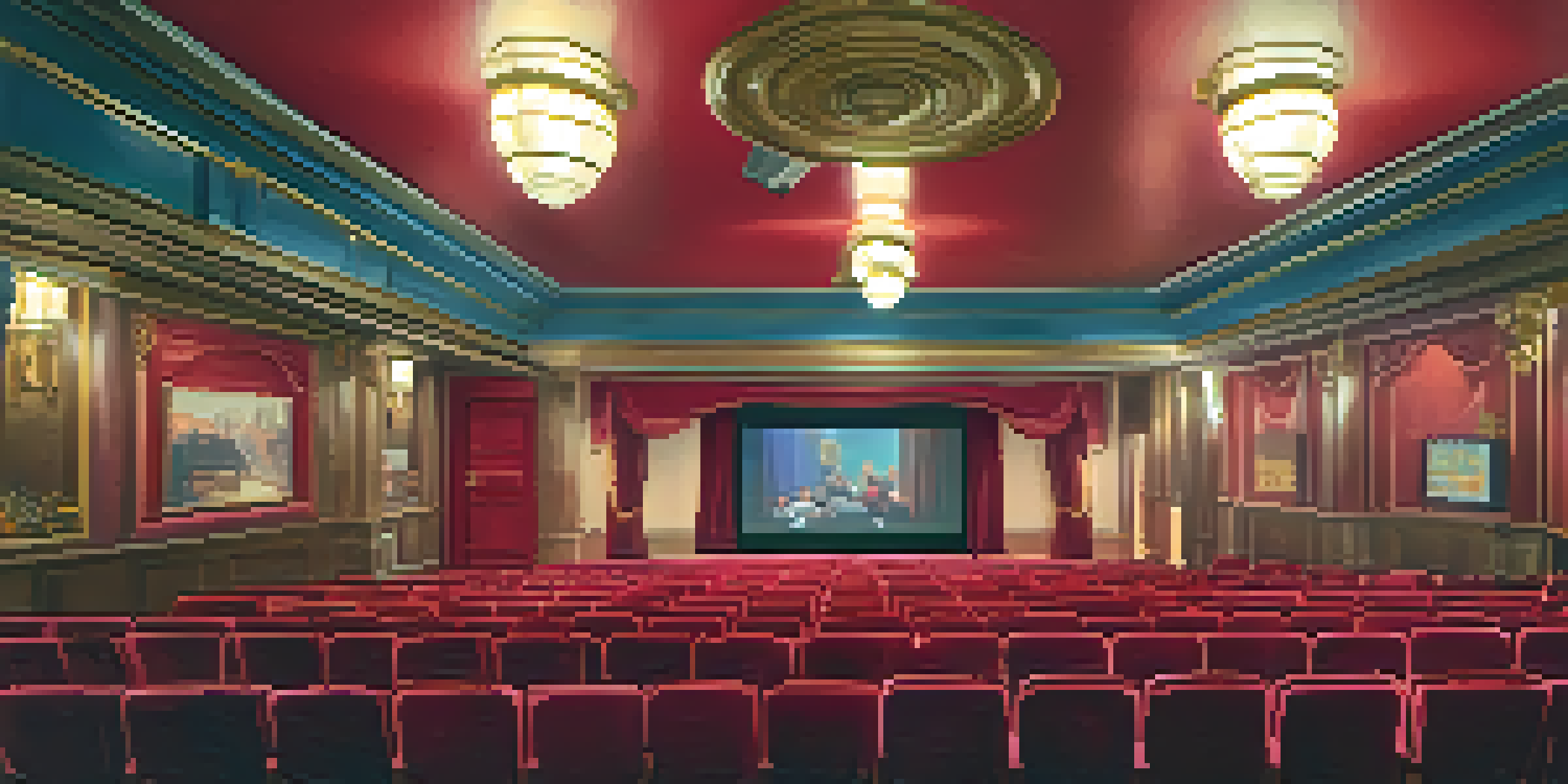Understanding Film Critique's Role in Societal Reflection

The Essence of Film Critique in Society
Film critique serves as an essential lens through which we can understand societal values and issues. By analyzing films, critics illuminate themes, motifs, and narratives that resonate with the audience's lived experiences. This process encourages viewers to reflect on their own beliefs and societal norms, creating a dialogue between the artwork and its audience.
Film is a powerful tool for social change, and critics can inspire audiences to confront uncomfortable truths.
Critics don’t just share opinions; they dissect how films portray social constructs such as race, gender, and class. For instance, a critique might explore how a particular film challenges stereotypes or reinforces them, prompting audiences to reconsider their perspectives. In this way, film critique acts as both a mirror and a catalyst for societal reflection.
Moreover, it recognizes the power of storytelling in shaping culture. When a film highlights social injustices or celebrates diversity, the critique can amplify its impact, urging society to address these issues. Thus, film critique not only evaluates art but also influences the cultural conversation.
Historical Context of Film Critique
Understanding the historical context of film critique is vital for appreciating its role in society. From the early days of cinema, critics have shaped public perception by discussing the cultural significance of films. This tradition began with newspaper reviewers and evolved into more formal critiques, including academic analyses that explore deeper societal implications.

For example, during the Golden Age of Hollywood, critiques often reflected the moral codes and values of the time, influencing what films were produced and how audiences received them. As societal norms shifted, so too did the conversation around film, with critics challenging and redefining what constitutes acceptable representation in media.
Film Critique Reflects Society
Film critique serves as a vital lens for understanding social values and encouraging dialogue about societal norms.
Today, this historical perspective allows us to see how past critiques have paved the way for contemporary discussions around inclusivity and representation. It highlights the ongoing evolution of film as a societal mirror and the crucial role critics play in advocating for change.
The Critic as a Cultural Commentator
Critics often assume the role of cultural commentators, interpreting films within the broader societal context. They examine how a film reflects, critiques, or reinforces cultural values, facilitating a deeper understanding of the narratives presented. This commentary can provoke thought and inspire action, urging audiences to engage with the issues depicted onscreen.
Critics are cultural commentators who interpret films within the broader societal context, provoking thought and inspiring action.
For instance, a film that addresses climate change may prompt critics to discuss environmental responsibility in our daily lives. These discussions can resonate far beyond the screen, influencing public opinion and even policy decisions. By connecting films to real-world issues, critics help bridge the gap between entertainment and activism.
Moreover, critics often use their platforms to highlight underrepresented voices in film. By advocating for diverse narratives, they contribute to a richer cultural landscape that reflects the complexities of society. This advocacy is essential for fostering an inclusive film industry that resonates with a wider audience.
The Impact of Social Media on Film Critique
Social media has transformed the landscape of film critique, democratizing the conversation around films. Platforms like Twitter, Instagram, and YouTube allow anyone to share their opinions, making film critique more accessible than ever. This shift has resulted in a diverse array of voices contributing to the dialogue, reflecting a broader spectrum of societal perspectives.
However, this change also raises questions about the quality and depth of critiques. While social media can amplify diverse viewpoints, it can also lead to superficial analyses driven by trends rather than thoughtful examination. Critics must navigate this landscape carefully, balancing the need for engagement with the responsibility to provide meaningful commentary.
Critics Influence Cultural Conversations
Critics play a crucial role in shaping public perception and advocating for diverse narratives that reflect the complexities of society.
Despite these challenges, social media has catalyzed important discussions around representation and inclusivity in film. Critics who utilize these platforms can reach new audiences, encouraging conversations that extend beyond traditional review formats. This evolution signifies a vital shift in how society engages with the art of film.
The Role of Audience Reception in Film Critique
Audience reception plays a crucial role in shaping film critique, as viewers bring their own experiences and perspectives to the viewing experience. A film's impact can vary widely depending on the audience's cultural background, personal beliefs, and social context. Critics often consider these factors when analyzing a film's effectiveness in communicating its themes.
For example, a film that resonates deeply with one demographic may not have the same effect on another. This discrepancy highlights the importance of understanding the audience as an active participant in the conversation around film. Critics must navigate these complexities to provide a well-rounded analysis that acknowledges diverse viewpoints.
Ultimately, audience reactions can influence the trajectory of a film's legacy, impacting how future films are created and critiqued. This interplay between critique and reception creates a dynamic dialogue that reflects the changing values and concerns of society.
Film Critique as a Tool for Social Change
Film critique can serve as a powerful tool for social change, challenging audiences to confront uncomfortable truths. By examining the issues depicted in films, critics can draw attention to societal problems such as inequality, discrimination, and injustice. This critical lens not only informs viewers but also inspires them to take action.
For instance, critiques of films that tackle sensitive topics, like racism or sexism, can spark essential conversations that lead to greater awareness and advocacy. By framing these issues within the context of film, critics help audiences understand their real-world implications and the importance of collective action.
Social Media Transforms Critique
The rise of social media has democratized film critique, allowing diverse voices to contribute while also raising questions about the depth of analysis.
Furthermore, when critics champion films that promote positive social messages, they can amplify the work of marginalized creators. By celebrating diverse narratives, critiques foster a more inclusive film industry that reflects the rich tapestry of human experience. This advocacy is essential for driving meaningful change in society.
Future Directions for Film Critique and Society
As society continues to evolve, so too will the role of film critique in reflecting and shaping cultural values. The rise of streaming platforms and global cinema is expanding the diversity of stories being told, offering critics new material to analyze. This shift presents exciting opportunities for critics to explore underrepresented narratives and challenge dominant cultural paradigms.
Additionally, the increasing intersection of technology and film presents new avenues for critique. Virtual reality and interactive storytelling are changing how audiences engage with narratives, prompting critics to rethink traditional frameworks of analysis. Embracing these innovations will be crucial for staying relevant in a rapidly changing landscape.

Looking ahead, the future of film critique lies in its ability to adapt and respond to societal changes. By fostering inclusive conversations and examining the complexities of modern narratives, critics can continue to play a vital role in shaping the cultural dialogue around film and its impact on society.